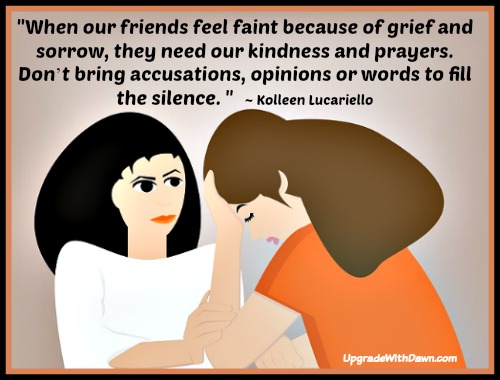Five Ways to Speak God's Love Language
Debbie W. Wilson always has a fresh perspective on familiar Christian truth. In this Relationship with God UPGRADE, she reminds us that there are ways we can learn to "speak God's love language."
Debbie says, “My husband doesn’t show me love,” the distraught woman who sat before me complained.
I (Dawn) think that nearly every married woman has thought that from time to time. We just want more and more love—and not only from a spouse! But remember, when we "speak" someone's love language, it isn't always with words.
Debbie continues . . .
This woman’s husband provided for her financially, maintained her car without being asked, vacuumed the house, and cleaned up after supper. But she longed for quality time and deep conversations.
Because acts of service were not her love language, this woman had overlooked her husband’s demonstrations of love.
A hunger to express and experience love runs through the human DNA.
Considering this made me wonder if that need extends to our relationship with God. If so, what are some ways to enhance this love relationship? Does God have a love language?
Hebrews 11:6 says faith is God’s love language.
“And without faith it is impossible to please God, because anyone who comes to him must believe that he exists and that he rewards those who earnestly seek him” (NIV).
Did you catch the reciprocal nature of faith as described in this verse? Those who believe in God also believe God rewards them for seeking Him.
Loving Jesus enables us to receive His love. John 14:21 says,
“Those who love me will have my Father’s love, and I, too, will love them and show myself to them” (GW).
Let’s look at ways to enhance our love relationship with God.
5 Ways to Speak God’s Love Language
1. Pray
Prayer demonstrates a relationship with God and faith that He is good.
“Ask and it will be given to you; seek and you will find; knock and the door will be opened to you. For everyone who asks receives; the one who seeks finds; and to the one who knocks, the door will be opened… Which of you, if your son asks for bread, will give him a stone? Or if he asks for a fish, will give him a snake? If you, then, though you are evil, know how to give good gifts to your children, how much more will your Father in heaven give good gifts to those who ask him!” (Matt. 7:7-11 NIV).
2. Demonstrate Trust through Thanksgiving
Gratitude demonstrates faith in God’s goodness and sovereignty. It shows I believe He is bigger than my mistakes and the wrongs I’ve endured (Rom. 8:28).
Faith allows me to pray with thanksgiving before I see God’s answer (Phil. 4:6-8).
A large ministry fired an honorable young man without cause. His mother wrestled with God over this betrayal. Before the year was out, a scandal hit the press concerning those who’d mistreated her son.
“God spared my son,” she said. “And I’d thought He’d forgotten him.”
“Whatever happens, give thanks, because it is God’s will in Christ Jesus that you do this” (1 Thes. 5:18 GW).
3. Worship
Worship shows we believe He is worthy of our devotion and reminds us He’s bigger than anything clamoring for our time and attention.
“Step out of the traffic! Take a long, loving look at me, your High God, above politics, above everything” (Ps. 46:10 The Message).
4. Obey
Obedience demonstrates love and faith (Jn. 14:15-16).
“Whoever knows and obeys my commandments is the person who loves me” (Jn. 14:21 GW).
“In fact, this is love for God: to keep his commands. And his commands are not burdensome” (1 Jn. 5:3 NIV).
5. Live Clean
Receiving and appreciating our forgiveness shows faith in Jesus and increases our love for Him (1 Jn. 1:9, Titus 2:14).
“I tell you, her sins—and they are many—have been forgiven, so she has shown me much love. But a person who is forgiven little shows only little love” (Luke 7:47 NLT).
Through faith we express our love to God and experience His love in return.
Every step we take in faith causes God’s heart to sing.
Does your relationship with God need a boost? Consider the list above. Which one needs your attention?
Debbie W. Wilson, Bible teacher and former biblical counselor, combines insight and  encouragement to
encouragement to  inspire people to trust Christ with their lives. Her books include Little Faith, Big God, Little Women, Big God, and Give Yourself a Break. She and her husband Larry founded Lighthouse Ministries, a nonprofit biblical counseling and Bible study ministry. Debbie enjoys dark chocolate, a good mystery, and the antics of her two standard poodles. Find free resources and connect with Debbie at RefreshingFaith.com.
inspire people to trust Christ with their lives. Her books include Little Faith, Big God, Little Women, Big God, and Give Yourself a Break. She and her husband Larry founded Lighthouse Ministries, a nonprofit biblical counseling and Bible study ministry. Debbie enjoys dark chocolate, a good mystery, and the antics of her two standard poodles. Find free resources and connect with Debbie at RefreshingFaith.com.
Graphic adapted, courtesy of Kalhh at Pixabay.
 Post a Comment → Posted on
Post a Comment → Posted on  Thursday, February 16, 2023 at 9:56AM
Thursday, February 16, 2023 at 9:56AM  Clean living,
Clean living,  Debbie W. Wilson,
Debbie W. Wilson,  Faith,
Faith,  God's Love Language,
God's Love Language,  Love Language,
Love Language,  Obedience,
Obedience,  Prayer,
Prayer,  Speak to God,
Speak to God,  Thanksgiving,
Thanksgiving,  Upgrade with Dawn,
Upgrade with Dawn,  Worship Upgrade Your Life
Worship Upgrade Your Life  Communication,
Communication,  Obedience,
Obedience,  Prayer,
Prayer,  Relationship with God,
Relationship with God,  Worship
Worship 















